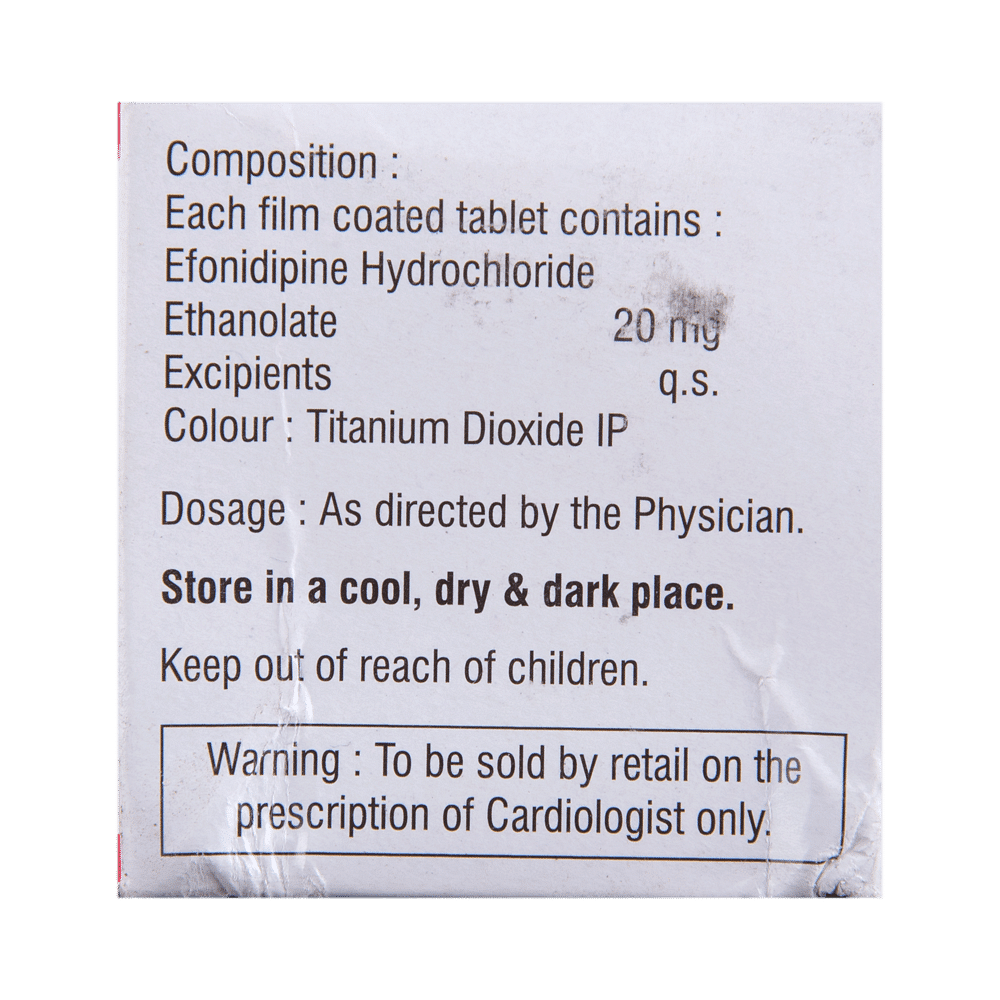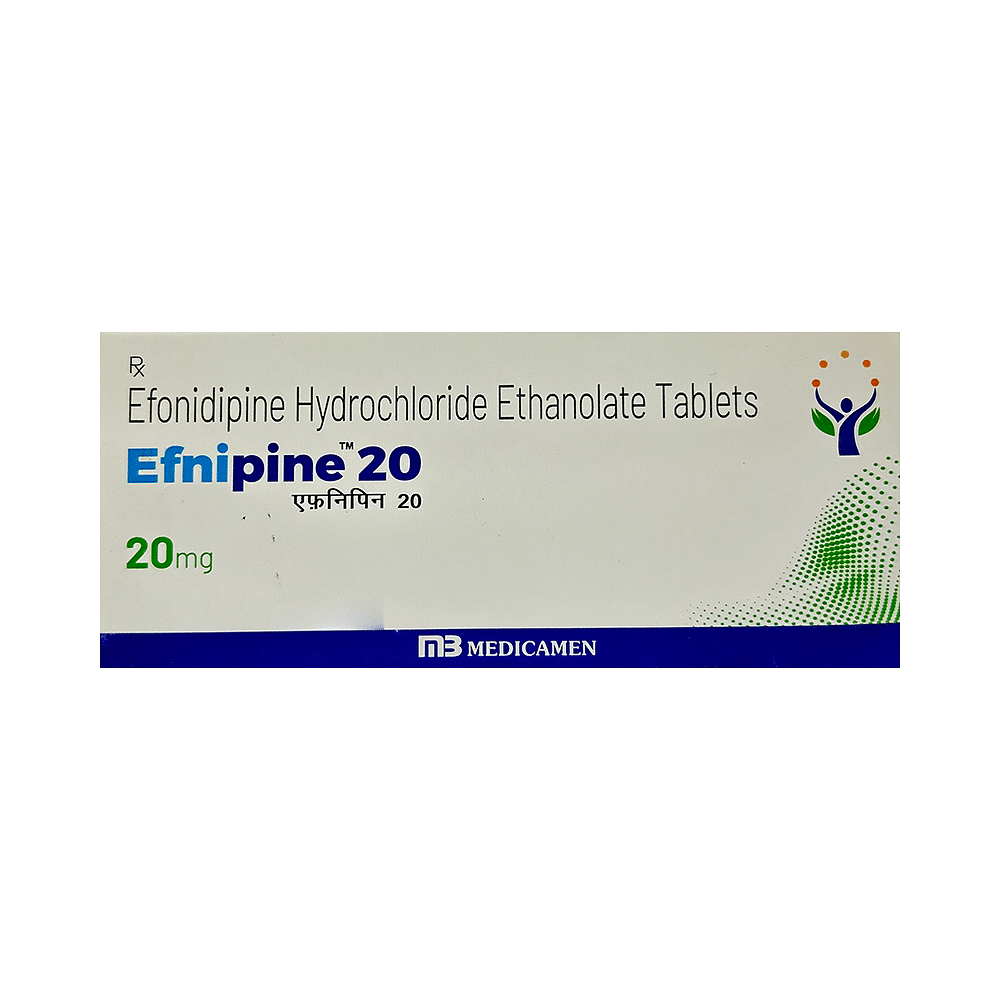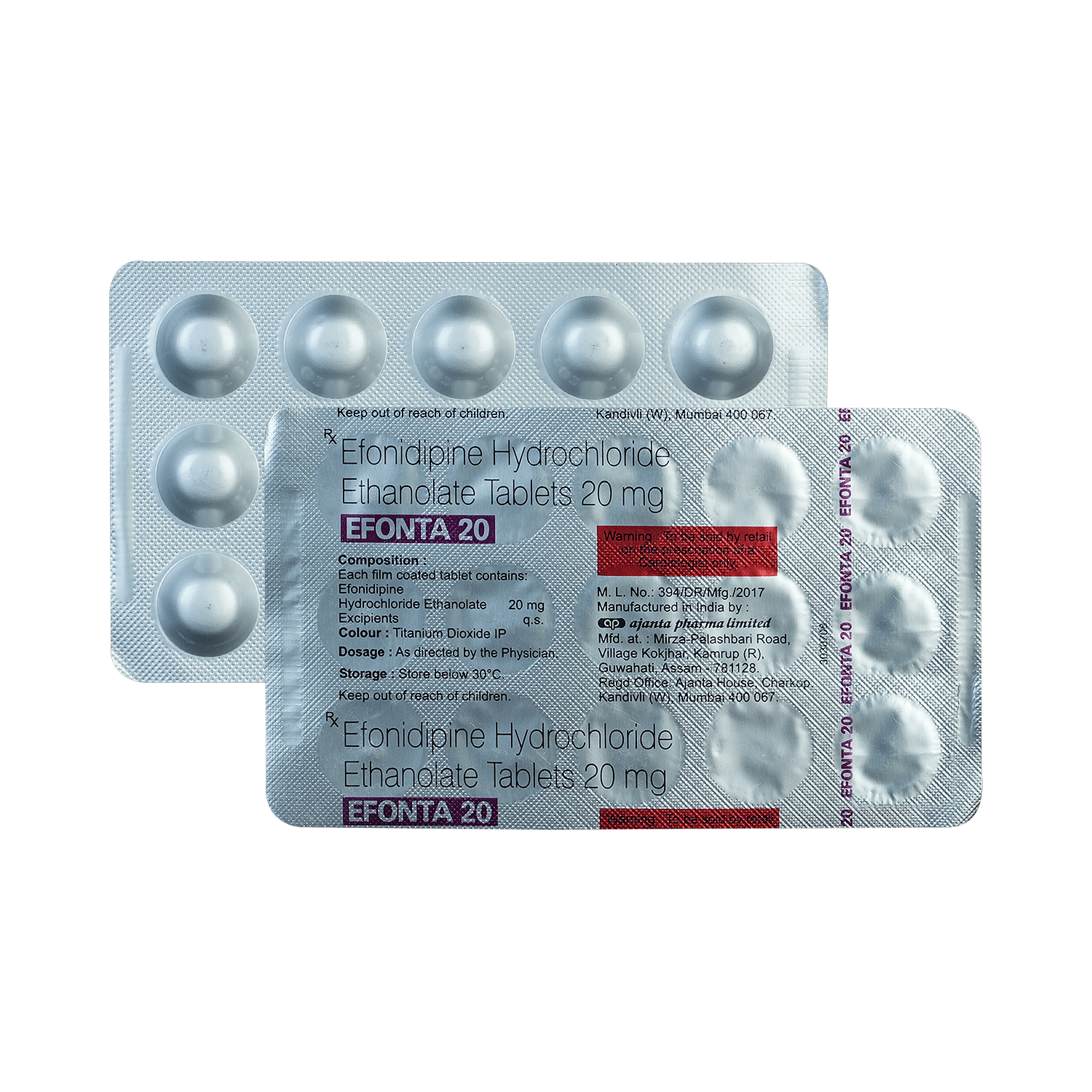
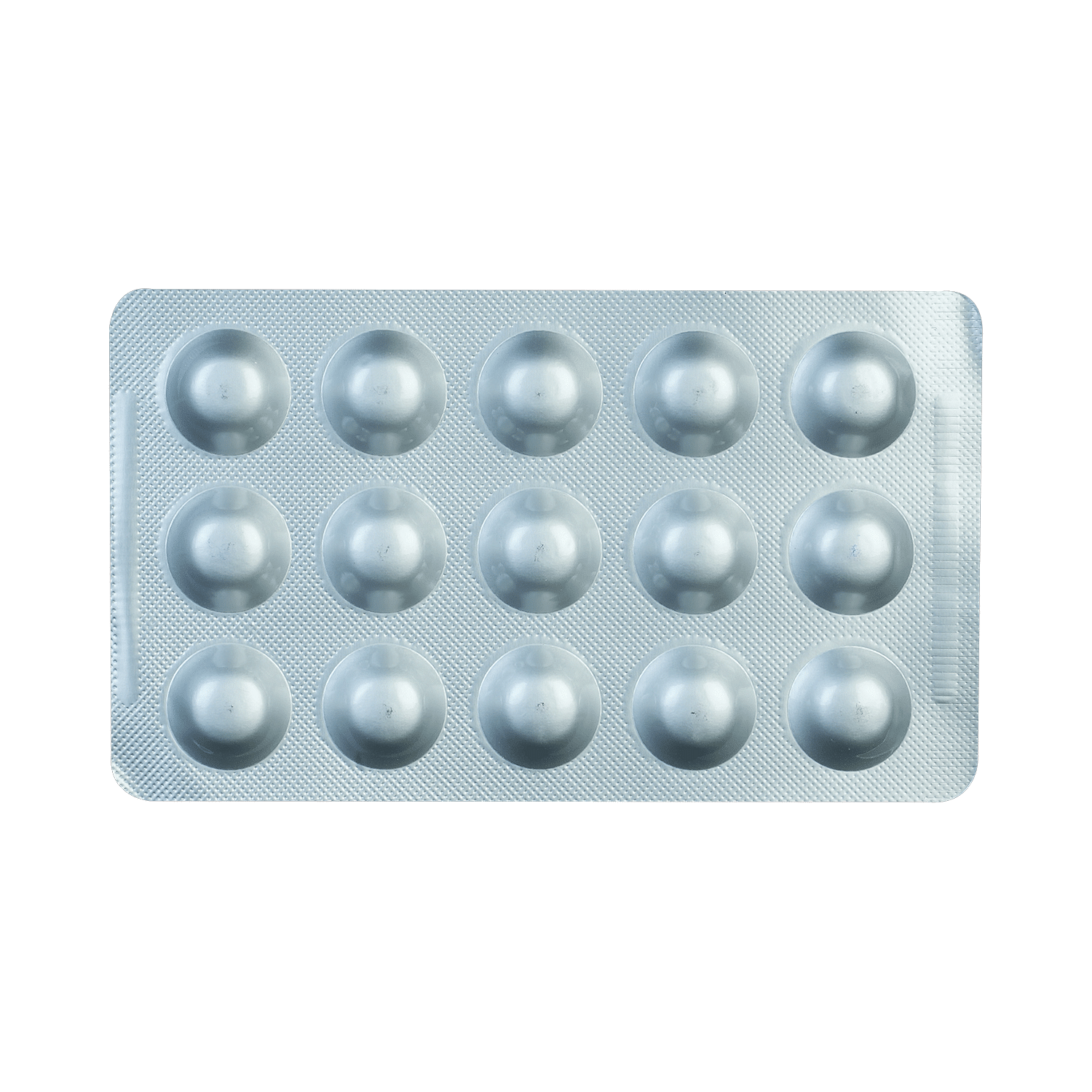
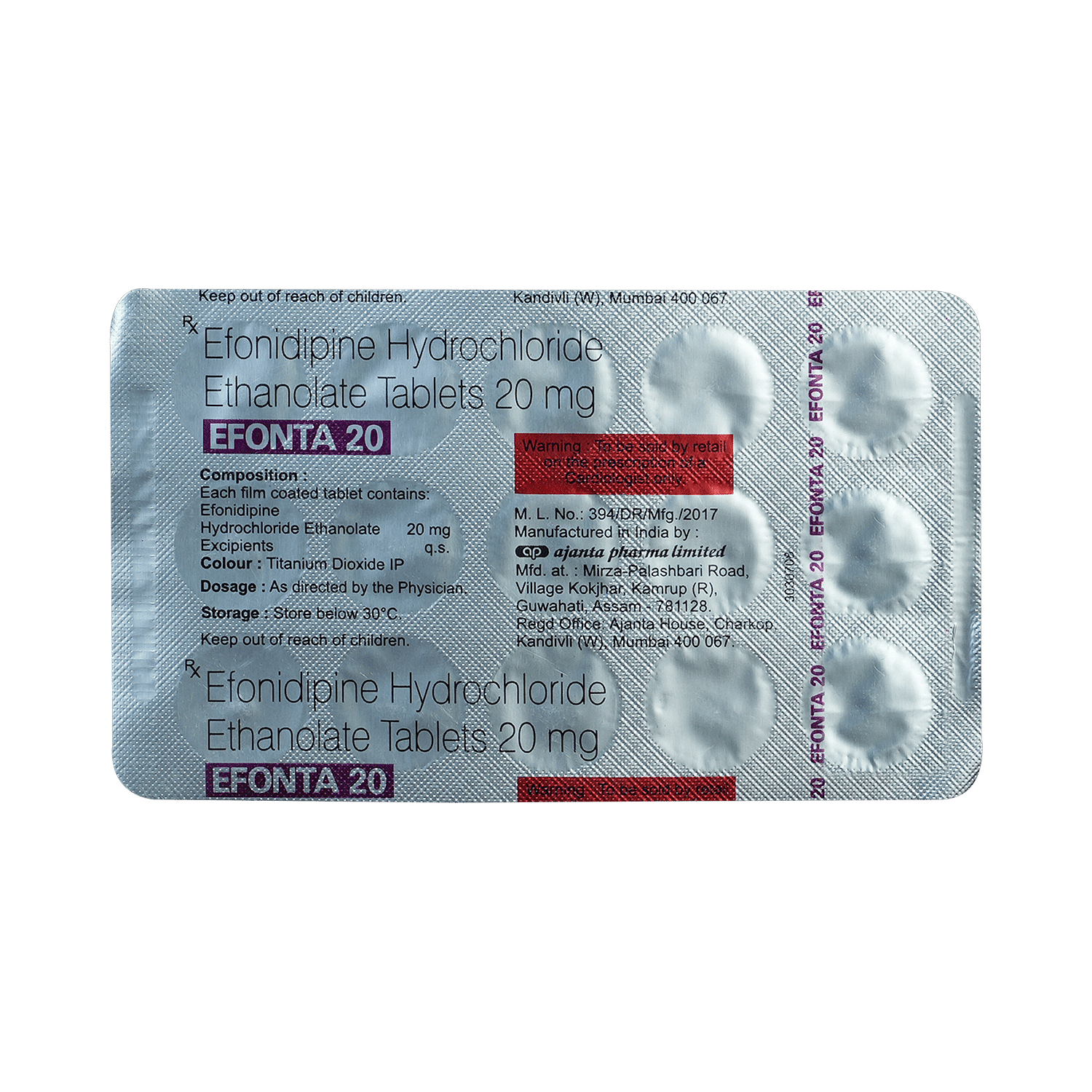
Efonta 20 Tablet
Manufacturer
Ajanta Pharma Ltd
Salt Composition
Efonidipine (20mg)
Key Information
Short Description
Efonta 20 Tablet is used in the management of hypertension (essential hypertension and renal parenchymal hypertension).
Dosage Form
Tablet
Introduction
Efonta 20 Tablet is used in the management of hypertension (essential hypertension and renal parenchymal hypertension). It helps to lower blood pressure and reduce the workload of the heart. This helps prevent heart attacks and strokes.
Directions for Use
Take this medicine in the dose and duration as advised by your doctor. Swallow it as a whole. Do not chew crush or break it. Efonta 20 Tablet may be taken with or without food but it is better to take it at a fixed time.
Safety Information
Side Effects
No common side effects listed.
Alcohol Warning
Caution is advised when consuming alcohol with Efonta 20 Tablet. Please consult your doctor.
Breastfeeding Warning
Efonta 20 Tablet is probably unsafe to use during breastfeeding. Limited human data suggests that the drug may pass into the breastmilk and harm the baby.
Pregnancy Warning
Information regarding the use of Efonta 20 Tablet during pregnancy is not available. Please consult your doctor.
Interacting Medicines
Amlodipine Aprepitant Atazanavir Atorvastatin
How it works
Efonta 20 Tablet is a calcium channel blocker. It regulates the blood pressure by relaxing the blood vessels and reducing the pressure on them thereby making it easier for the heart to pump more blood throughout the body. In this way it normalizes the blood pressure in patients with high blood pressure.
Quick Tips
A sudden drop in your blood pressure may occur especially when you first start taking Efonta 20 Tablet. To lower the chance of feeling dizzy or passing out rise slowly if you have been sitting or lying down. It can cause ankle or foot swelling. To reduce the swelling raise your legs while you are sitting down. Talk to your doctor if it does not go away. It may cause dizziness. Do not drive or perform any activity that requires mental focus until you know how Efonta 20 Tablet affects you. Inform your doctor if you are pregnant planning a pregnancy or breastfeeding.
Related Medicines
Frequently asked questions
What is the purpose of Efonta 20 Tablet?
Efonta 20 Tablet is a medication used to treat high blood pressure. It belongs to a group of medicines that block calcium channels in the blood vessels. It works by relaxing the blood vessels in patients with high blood pressure, widening the diameter of the blood vessels, and allowing blood to pass through them more easily.
Is Efonta 20 Tablet harmful to the kidneys?
No, there is no evidence that Efonta 20 Tablet causes deterioration of kidney problems. In fact, its blood pressure-lowering effect helps to prevent injury to the kidneys due to hypertension. Efonta 20 Tablet can be used in normal doses in patients with kidney problems.
When should I take Efonta 20 Tablet?
Efonta 20 Tablet can be taken at any time in the morning or evening, usually prescribed once daily. It is essential to take it as advised by your doctor and at the same time each day to maintain consistent levels of medicine in the body.
How long do I need to take Efonta 20 Tablet?
You should continue taking Efonta 20 Tablet for as long as your doctor has recommended. It may be necessary to take it lifelong. Do not stop taking it, even if you feel well or your blood pressure is well controlled, as this may lead to an increase in blood pressure and worsening of your condition.
Is Efonta 20 Tablet a beta-blocker?
No, Efonta 20 Tablet is not a beta-blocker. It belongs to a class of medicines known as calcium channel blockers, which lower blood pressure by relaxing the blood vessels and allowing blood to flow through them more easily.
What are the serious side effects of Efonta 20 Tablet?
Efonta 20 Tablet may cause serious side effects such as liver problems (yellowing of skin, nausea, vomiting, and loss of appetite), pancreatitis (severe stomach pain, nausea, and vomiting), and recurrent chest pain, which may be indicative of a heart attack. However, these side effects are rarely seen. It is essential to follow your doctor's advice while taking this medicine.
What should I avoid while taking Efonta 20 Tablet?
Consult your doctor before starting any new prescription or non-prescription medicines or supplements. Avoid eating grapefruit or drinking grapefruit juice while taking Efonta 20 Tablet. Additionally, adhere to a low sodium and low fat diet, and follow the lifestyle changes advised by your doctor.
I have developed ankle edema and swelling over my feet after using Efonta 20 Tablet. What should I do?
Efonta 20 Tablet can cause ankle or foot swelling. To alleviate this, raise your legs while sitting down. If the swelling persists, consult your doctor for further guidance.



